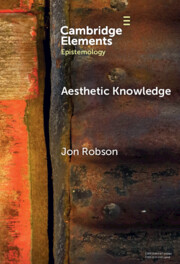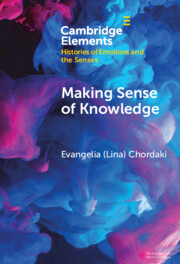Refine search
Actions for selected content:
382 results
5 - Theology as a Science
- from Part II - Theological Themes
-
-
- Book:
- The Origins of Scholasticism
- Published online:
- 18 November 2025
- Print publication:
- 30 November 2025, pp 157-182
-
- Chapter
- Export citation
3 - Maṣlaḥa in Ibn ʿAbd al-Salām’s Legal Philosophy
-
- Book:
- An Islamic Legal Philosophy
- Published online:
- 19 November 2025
- Print publication:
- 27 November 2025, pp 103-133
-
- Chapter
- Export citation
Chapter 9 - Qualitative Research
- from Section 2 - Tools and Methodologies
-
-
- Book:
- Research Methods in Mental Health
- Published online:
- 31 October 2025
- Print publication:
- 20 November 2025, pp 135-155
-
- Chapter
- Export citation

Aesthetic Knowledge
-
- Published online:
- 11 November 2025
- Print publication:
- 04 December 2025
-
- Element
-
- You have access
- HTML
- Export citation
Chapter 19 - Making Audiences
- from Part IV - Worlds of Print
-
-
- Book:
- African Literature in Transition
- Published online:
- 23 October 2025
- Print publication:
- 06 November 2025, pp 374-391
-
- Chapter
- Export citation
10 - Saving the Appearances: The Direction of Time and Time-Reversal Invariance
- from Part III - The Arrow of Time and Time-Reversal Invariance
-
-
- Book:
- The Arrow of Time
- Published online:
- 28 October 2025
- Print publication:
- 30 October 2025, pp 198-222
-
- Chapter
- Export citation
Chapter 4 - Bloomsbury and the New Biography
- from Part I - Aesthetic Bloomsbury
-
-
- Book:
- A History of the Bloomsbury Group
- Published online:
- 09 October 2025
- Print publication:
- 23 October 2025, pp 52-67
-
- Chapter
- Export citation
Remembering Lysenko: when ideology and science meet
-
- Journal:
- The British Journal of Psychiatry , FirstView
- Published online by Cambridge University Press:
- 25 September 2025, pp. 1-3
-
- Article
-
- You have access
- HTML
- Export citation
Against Causal Conditions
-
- Journal:
- Episteme , First View
- Published online by Cambridge University Press:
- 18 September 2025, pp. 1-12
-
- Article
-
- You have access
- Open access
- HTML
- Export citation
Virtuous Belief Outsourcing
-
- Journal:
- Episteme , First View
- Published online by Cambridge University Press:
- 01 September 2025, pp. 1-16
-
- Article
-
- You have access
- Open access
- HTML
- Export citation
The New Instrumental Turn in Nigerian Historical Scholarship
- Part of
-
- Journal:
- The Journal of African History / Volume 66 / 2025
- Published online by Cambridge University Press:
- 01 September 2025, e11
-
- Article
-
- You have access
- Open access
- HTML
- Export citation
Chapter 3 - Knowledge Doesn’t Exist
-
- Book:
- Knowledge Doesn't Exist and Other Thoughts on Critical Thinking
- Published online:
- 22 October 2025
- Print publication:
- 21 August 2025, pp 32-45
-
- Chapter
- Export citation
Humility and Complexity
-
- Journal:
- Canadian Journal of Philosophy , FirstView
- Published online by Cambridge University Press:
- 20 August 2025, pp. 1-12
-
- Article
-
- You have access
- Open access
- HTML
- Export citation
Chapter 5 - Socrates and Conflicting Epistemic Requirements
- from Part III - Internal and External Authorities
-
-
- Book:
- Platonic Autonomy
- Published online:
- 07 August 2025
- Print publication:
- 31 July 2025, pp 106-127
-
- Chapter
- Export citation
A question of alignment – AI, GenAI and applied linguistics
-
- Journal:
- Annual Review of Applied Linguistics / Volume 45 / March 2025
- Published online by Cambridge University Press:
- 24 July 2025, pp. 315-336
-
- Article
-
- You have access
- Open access
- HTML
- Export citation
Introduction
-
- Book:
- Technologies of the Marvellous in Ancient Greek Religion
- Published online:
- 04 September 2025
- Print publication:
- 24 July 2025, pp 1-30
-
- Chapter
-
- You have access
- Open access
- HTML
- Export citation
Pusey, Scripture and Epistemology
-
- Journal:
- Journal of Anglican Studies , First View
- Published online by Cambridge University Press:
- 04 July 2025, pp. 1-9
-
- Article
- Export citation
Chapter 17 - AfroLatina Embodied Archives of Knowledge Production
- from Part IV - Theoretical Turns
-
-
- Book:
- Latinx Literature in Transition, 1992–2020
- Published online:
- 19 June 2025
- Print publication:
- 03 July 2025, pp 317-332
-
- Chapter
- Export citation

Making Sense of Knowledge
- Feminist Epistemologies in the Greek Birth Control Movement (1974–1986)
-
- Published online:
- 17 June 2025
- Print publication:
- 03 July 2025
-
- Element
- Export citation
Chapter 6 - Finance and the Critique of Infrastructural Reason
- from Part I - Conceptual Approaches
-
-
- Book:
- The Cambridge Global Handbook of Financial Infrastructure
- Published online:
- 21 May 2025
- Print publication:
- 05 June 2025, pp 64-74
-
- Chapter
-
- You have access
- Open access
- HTML
- Export citation
